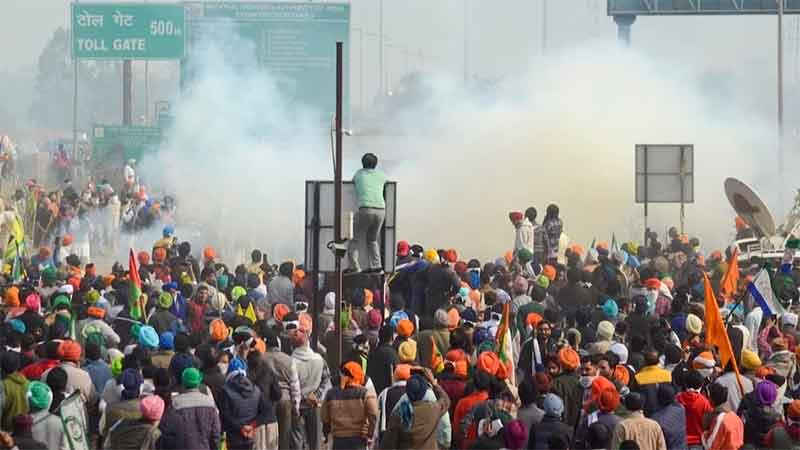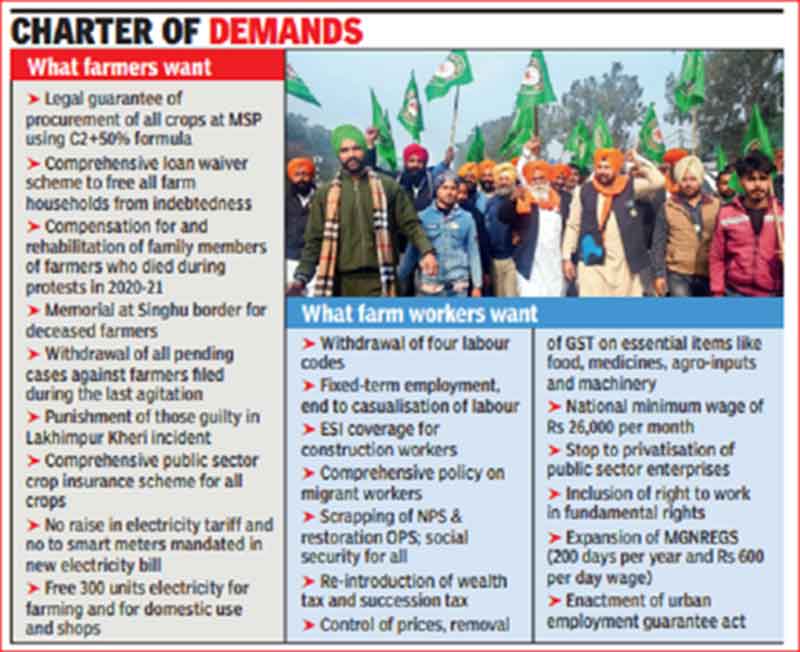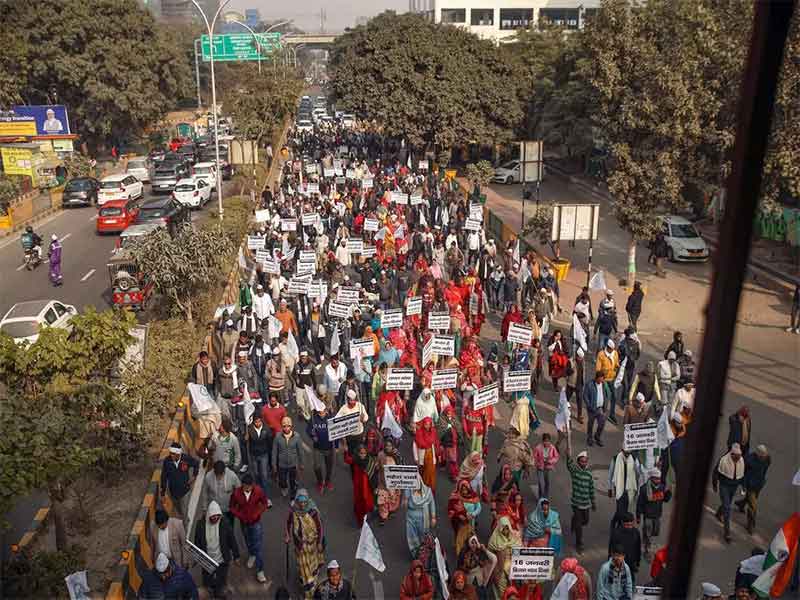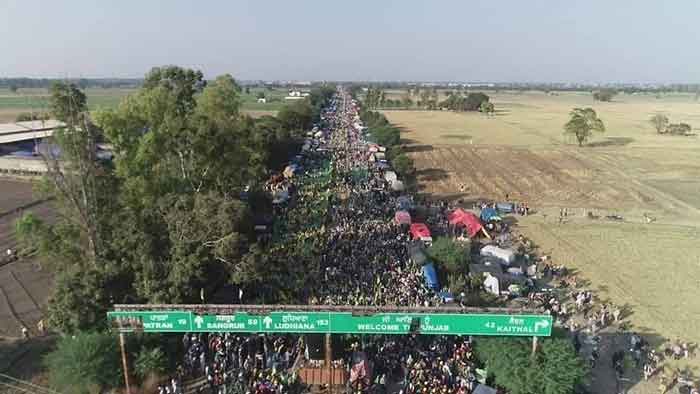
Instead of listening to the grievances of the farmers and objectively reporting the concerns raised during more than half a month-long farmers’ demonstrations being held around the areas in and around the national capital Delhi, the media is busy maligning them.
The pages of newspapers are filled with the negative stories and anti-farmers opinion pieces. The farmers continue to be portrayed as “gullible” ones who are purportedly being misled by the opposition parties out of their “opportunist politics”. The newly enacted farm laws that facilitate the big corporate companies in procuring the agricultural products are been hailed as good for the development and the so-called “new” India without ever discussing as to how these laws push the farmers further towards precarity and making both the farmers in particular and people in general further dependent on the market.
On the other hand, the fear of the farmers about the government withdrawing from its responsibility to pay the minimum support price (MSP) is being ignored by the media. To push the corporate agenda forward, the media has been making several attempts to portray a huge social movement as a law and order problem and one causing inconveniences to the common people. That accounts for the media’s shameless attempt to link the farmers’ protests to the Khalistani elements, a pejorative term used against the Sikhs of Punjab who were critical of the majoritarian politics.
Leading Hindi daily Dainik Jagran (National) is leading the campaign against the farmers. On December 7, 2020, the front page of its national edition carries an image of a traffic jam. Below the image the caption reads, “Due to the farmers’ protests, the people of Delhi are faced inconvenience. On Sunday, a big traffic jam was caused by the sit-in at UP gate”. Next to the image, there was a separate story about how “the opposition parties have entered the movement and they have supported the call for the national-wide strike” called by the farmers against the farm laws.
Continuing with its effort to malign the image of the protests, a separate story was published on the inside page (4) in which the writer cites the ruling of the Supreme Court to argue that “lodging protests does not mean that the roads were blocked for an indefinite period”. The author also tries to link the anti-CAA protests to the ongoing farmers’ protests by drawing a similarity in their alleged method of the blockade. While the author seems to be very annoyed by such demonstration on the road, she does not say a word about how the government is unwilling to listen to the opposition voices. Neither does she say a single word how the passing of the Farm Bills was done in the Houses of parliament and the gagging of the voices of the opposition leaders?
On the editorial page, the farmers’ protests were continued to be portrayed negatively. The editorial in Dainik Jagran (Dec 7) titled “awsarvadi rajniti” (opportunist politics) blames the opposition parties for targeting the Modi Government by using the farmers. Nowhere the editorial is willing to accept that the farmers have their agency or they might have genuine grievances against the Farm Laws. Look at the language of the editorial, “The way different political parties and NGOs are giving arguments in favor of the national strike to be held on December 8 by standing with the farmers is a clear indication that they are trying to achieve their narrow (sankirn) interests”.
The next day, December 8, Dainik Jagran published three big stories related to the Farmers but all three went against them. The top three headlines portrayed the image of the government as constructive and that of farmers destructive. “Government is working to handle the strike and is preparing for holding the dialogue” (Band se nipatne aur varta ki taiyari men juti sarkar). Next to it is Prime Minister Narendra Modi’s statement with the following headline: “Old laws are not relevant in new India” (Purane qanoon se nhin ban sakta hai naya Bharat).
Look at the irony.The Prime Minister wants us to believe that the demand for scrapping Farm laws preferred old laws to new laws. Are old laws always good? Are all new laws necessarily relevant for the new India? If we go by Modi’s laws, then, the colonial laws related to sedition should have no place in modern India. Similarly, the laws and customs based on centuries-old Brahminical scriptures should also be done away with. It is also interesting that the pro-corporate farm laws are being sold as those necessary for new India.
However, the most dangerous story was the one about the arrest of several people allegedly having links with Babbar Khalsa. The lead story of Dainik Jagran (December 8) also had a picture of the arrested persons. The report claims that the Special Cell of Delhi Police has foiled the attempts of Hijbul Mujahideen and Babbar Khalsa to blow up Delhi amid the farmers’ protest. The headline– “the conspiracy to cause Delhi to shake foiled, five terrorists arrested” (Dilli ko dahlane ki sazish nakam)– goes on to affirm the propaganda that the Farmers’ protests have the potential for causing big law and order problem as they are supported by the Khalistanis.
On the same day, several stories against the farmers’ protests were published on inside pages. “The farmers get caught in the trap of politics having given a national call to strike” (Bharat band ke elan se rajniti ke chakravyuh men phans gaye kisan). The sub-heading of the report reads thus “In the name of expressing solidarity, the Farmers’ protests are controlled by politicians”. Besides, there was a story of how corona guidelines are being violated during the protests and several farmers have fallen sick. Another story published in Dainik Jagran was about one farmers’ body known as “Shetkari Sangathan” that has called the new Farm Laws as providing the freedom to the farmers.
On the next page, the newspapers prominently published the statement of Union Minister Ravi Shankar Prasad in which he has accused the opposition leaders of taking double standards to the issue. Below Ravi Shankar Prasad’s story is the statement of Uttar Pradesh Chief Minister Yogi Adityanath in which he accused the opposition leaders of causing anarchy under the pretext of farmers. Dainik Jagran also published an editorial eulogizing Prime Minister Modi’s statement regarding the new (read pro-corporate) laws.
The job of the media is to present the facts and report all sides of the story but the media shamelessly presents just one side of the story. The views of the farmers and the opposition leaders were largely suppressed.
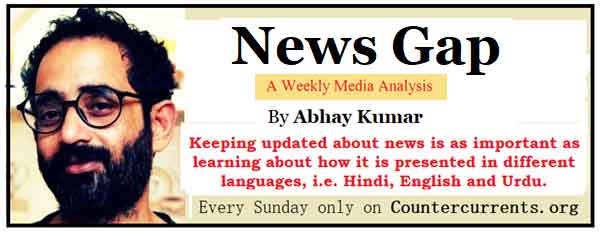
(Abhay Kumar is a Ph.D. from JNU. He is broadly interested in Minority and Social Justice. Earlier, he held a Post-Graduate Diploma in English Journalism from The Indian Institute of Mass Communication, New Delhi, and worked as a Delhi-based reporter with The Indian Express. You may write to him at [email protected]).
SIGN UP FOR COUNTERCURRENTS DAILY NEWSLETTER

